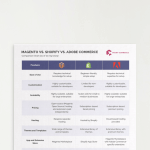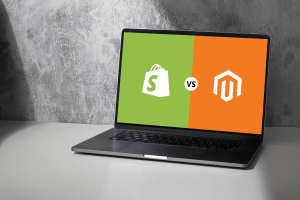Shopify and Magento (now owned by Adobe and renamed Adobe Commerce) are two of the leading ecommerce platforms on the market today. And with good reason. Both platforms have an array of benefits and provide countless opportunities for growth. But the two platforms also offer different services and, depending on the size of your e-commerce site and the level of coding skill you have within your business, one may be better than the other. Let’s take a look at how these tools differ, which is better for you and much more.
If you’re considering switching to Headless Magento, check out our previous article “Headless Magento: Is It Right for Your E-Commerce Business?”.

Download the PDF version of the comparison (it’s prettier & concise 😉)
Magento (Adobe Commerce) vs Shopify: what’s the difference?
Here’s is a quick description of both platforms.
Magento is an open-source e-commerce platform which is free to install. You will need to pay for security, web hosting, and extensions, which will allow you to add all the features you’d like to your e-commerce store. This platform is powerful, but may be difficult for those without coding knowledge. Note that, historically, Magento was open-source and Adobe Commerce was a paid platform. However, following the acquisition of Magento by Adobe, Adobe dropped the name Magento from its communications, but the 2 versions still exist.
Shopify is an e-commerce platform that is easy to use and designed for businesses of any size. It prioritizes simplicity and fast setup, and comes equipped with a variety of built-in tools and templates. This makes it a great option for businesses that want to establish an online presence without needing significant technical expertise.
Which platform is right for my business?
Magento and Shopify are both popular e-commerce platforms, but they have different strengths and weaknesses. The best platform for your business will depend on your specific needs and goals. Here’s a breakdown to help you decide:
Company Size:
- Magento: Magento, whether the old open-source version or the Adobe Commerce version, is a robust platform suitable for medium to large enterprises with more complex needs. It offers a wider range of features, customization and scalability options, making it ideal for businesses with a large product catalogue and complex requirements. However, it is also more complex to set up and maintain, so you’ll need a dedicated development team to manage it.
- Shopify: Shopify is versatile and suitable for businesses of all sizes, from small businesses to large enterprises. It’s known for its ease of use, which makes it an excellent choice for smaller businesses without extensive technical resources. However, Shopify’s customization options are more limited, and it may not be suitable for businesses that need a high level of flexibility, or that have very complex requirements.
Coding Skills:
- Magento: Magento is more developer-centric. If you have in-house coding skills or access to technical expertise, via a digital agency for example, you can leverage Magento’s flexibility to create highly customized solutions.
- Shopify: Shopify is designed to be user-friendly, with a simpler interface. It’s a good choice if you lack extensive coding skills and want a platform that’s easier to set up and manage using modules/apps provided by Shopify or the community. It has a drag-and-drop interface that makes it easy to create and edit your store.
Scalability:
- Magento: Magento offers excellent scalability, making it a solid choice if you plan to expand your business significantly in the future. It can handle a large volume of products and traffic with the right infrastructure. It can handle millions of orders per month with the right configuration. However, this will require significant skills and a considerable budget.
- Shopify: Shopify is also scalable, but it may have some limitations compared to Magento for very large businesses. However, it’s more than adequate for most small but fast-growing businesses. It can handle up to 50,000 orders per month on its most basic plan.
Future-proof features:
- Magento: Magento provides advanced features for e-commerce, including robust SEO capabilities, multi-store support, and extensive third-party integrations. Magento is also a more mature platform with a wider range of features. It is more customizable, which makes it easier to add new features in the future.
- Shopify: Shopify, on the other hand, is constantly adding new features. The platform already offers a wide range of features, and its app store allows you to add functionality as your business evolves. Shopify is also known for its ease of integration with third-party apps.
Maintenance and Support:
- Magento: Magento requires regular updates and maintenance, and you may need to rely on developers for support. It’s essential to have a plan for ongoing maintenance.
- Shopify: As a SaaS solution, Shopify handles hosting and updates for you, reducing the maintenance burden. Their support is generally accessible and responsive.

Magento frontend: what alternatives to Magento’s default theme?
Pricing: Shopify vs. Magento
Please note, all pricing is as listed on the USA websites. As such, prices may vary from one country to the next. Be sure to check the pricing in your country.
Shopify
Shopify offers three pricing plans:
- Basic Shopify: $39 per month / $29 per month if paid annually
- Shopify: $105 per month / $79 per month if paid annually
- Advanced Shopify: $399 per month / $299 per month if paid annually
- Shopify Plus: Pricing varies based on requirements.
The Basic Shopify plan is a good option for small businesses with limited needs. It includes features such as unlimited products, 2 staff accounts, 24/7 customer support, and much more.
The Shopify plan is a good option for medium-sized businesses. It includes all of the features of the Basic Shopify plan, plus additional features such as standard reporting, e-commerce automations, and discounted USPS rates.
The Advanced Shopify plan is a good option for large businesses. It includes all of the features of the Shopify plan, plus additional features such as advanced reporting, 15 staff accounts, lower fees, and international tax calculation.
Shopify Plus is the company’s enterprise-level solution for large businesses with complex needs. Pricing varies based on requirements, but it offers features like custom pricing, advanced security, and dedicated support.
In addition to monthly subscription fees, Shopify also charges transaction fees for all online credit card purchases. These fees range from 2.4% to 3.6% + 30 cents USD depending on the cards used and the type of transaction (online, in-person, third-party…).

For more on the differences between a Big Bang and a Progressive Migration approach
Magento
Magento are not as transparent as Shopify when it comes to their pricing. On their website, users need to contact them directly to get a quote.
However, Forbes offers some insights into Magento’s product offering. After Adobe acquired Magento in 2018, Adobe is now offering two different versions of Magento services: Magento Open Source & Adobe Commerce.
Magento Open Source is a free and open-source platform that offers limited features. It is an open-source platform that requires some technical skills to set up. However, it comes with essential features such as a user-friendly website builder with a drag-and-drop interface, site search and catalog management, mobile optimization, integrated checkout and payment options, and an app marketplace for extensions and add-ons.
It is important to note that while open-source products offer a lot of flexibility, they also have certain limitations. You will need to pay separately for general website maintenance, backups, your domain name, web hosting, and any customizations. The total cost will vary depending on which services you choose.
Adobe Commerce is a comprehensive product that includes advanced marketing tools, PCI compliance, and technical support. This offer is split into two plans Adobe Commerce Pro & Managed Services. More details here.
Adobe does not provide any pricing information for these two plans. You will have to provide your contact information on the relevant page, then wait for a salesperson to get in touch with you and offer you a personalized quote.
Some of the advanced functionalities that level up your e-commerce business when you sign up for Adobe Commerce are:
- Visual merchandising
- Customer loyalty tools
- Automatic updates
- Page loading priority
- Performance monitoring
- And much more
Pricing will depend on your store’s volume and how many services it needs. It is estimated that with Adobe Commerce’s advanced services, stores can start at around $30,000 per year. Monthly cost breakdowns should be assessed once you have your annual plan in place. Even with Adobe’s support and improved functionality, setting up and creating stores still need the help of a developer. Magento Commerce Cloud also has a $40,000 price point. The project will likely cost upwards of $200,000 in total.
However, if your e-commerce business is enterprise-level the price tag will likely be significantly higher as the features required will be more complex and the order numbers will be more substantial.

Deep-dive into Composable Commerce and Get Your Questions Answered!
Shopify vs Magento vs Adobe Commerce: Full Comparison Chart
| Feature | Shopify | Magento | Adobe Commerce |
|---|---|---|---|
| Ease of Use | Beginner-friendly, simple setup | Requires technical knowledge for setup | Requires technical expertise for setup |
| Customization | Limited for non-developers | Highly customizable, suitable for developers | Highly customizable, suitable for developers |
| Scalability | Scales well for small to medium businesses | Highly scalable, suitable for large enterprises | Highly scalable, suitable for large enterprises |
| Pricing | Subscription-based, tiered pricing | Open-source (Magento Open Source), hosting and extensions paid independently | Subscription-based, premium pricing |
| Hosting | Hosted by Shopify | Requires separate hosting | Cloud-based hosting provided |
| Themes and Templates | Extensive library of themes | Wide range of themes and templates | Extensive library with premium themes |
| App and Extension Store | Shopify App Store | Magento Marketplace | Magento Marketplace with Adobe Commerce-specific extensions |
| SEO Capabilities | Good SEO features | Strong SEO capabilities | Strong SEO capabilities |
| Security | High security standards | Strong security features | Enhanced security features |
| Support | 24/7 customer support | Community support and premium support plans | Premium support and Adobe partnership |
| Payment Gateways | Wide range of gateways | Supports various payment gateways | Extensive payment gateway support |
| Multi-Store Support | Limited multi-store capabilities | Supports multi-store setups | Supports multi-store setups |
| Mobile Responsiveness | Mobile-responsive designs | Requires responsive design implementation | Mobile-responsive designs |
| Inventory Management | Basic inventory management | Advanced inventory management | Advanced inventory management |
| Community and Resources | Active community and resources | Strong Magento community | Adobe-backed resources and community |
| Abandoned Cart Recovery | Built-in feature | Available through extensions | Available through extensions |
| Coding and Development | Minimal coding required | Requires coding knowledge | Requires coding knowledge |
| Integration and APIs | Extensive third-party integrations | Rich API support | Rich API support |
| Database Management | Simplified database management | Requires database management skills | Requires database management skills |
| Performance Optimization | Handled by Shopify | Requires optimization efforts | Requires optimization efforts |
| Extension Development | Limited for non-developers | Supports custom extension development | Supports custom extension development |
| Data Import/Export | Import/export tools available | Robust import/export capabilities | Robust import/export capabilities |
| Security and Patching | Automatic updates and security | Requires manual updates and security patches | Automatic updates and security |
| Scalable Architecture | Cloud-based architecture | Scalable architecture | Scalable architecture |
| Server Requirements | Not applicable (hosted) | Hosting-dependent | Hosting provided by Adobe |
| Content Management | Basic content management | Basic content management | Integration with Adobe Experience Manager |
So, which to choose?
In short, if we were to summarise in 2 points, we would say:
- Shopify: Best for small businesses with limited resources or no coding skills, though they are also developing their “Shopify Plus” enterprise offer.
- Magento (Adobe Commerce): Best for medium to large businesses with more complex needs or some coding skills
